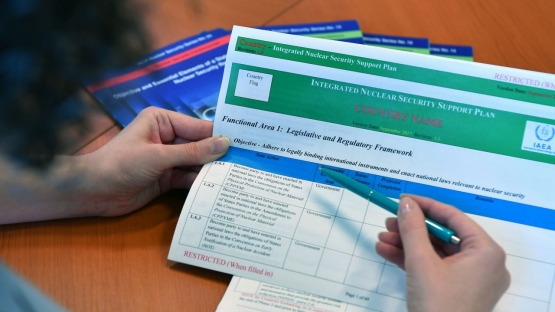Romania’s National Commission for Nuclear Activities Control (CNCAN) launched a virtual national training course on authorization and inspection for the security of radioactive material and associated facilities and activities, developed based on IAEA training series. The training materials and methodology were developed by CNCAN in cooperation with the IAEA.
Conducted in Romanian, the course connected 20 CNCAN inspectors of varying levels of experience to establish a common approach to authorizations and inspections associated with security of radioactive material, associated activities and facilities. The course was based on the national nuclear regulatory framework and integrated the international good practices for authorization, inspection and enforcement.
Romania has two nuclear power reactors, producing around 17% of the country’s electricity.
“The process by which regulatory functions are carried out by regulators is crucial to the implementation of the regulatory requirements,” said Sorin Repanovici, a senior expert at CNCAN. “Based on our Integrated Nuclear Security Support Plan, we worked with the IAEA to strengthen our nuclear security regulatory framework and, now, with this adaptation of the IAEA’s training, we can enhance the effectiveness, consistency and sustainability of implementation of the regulatory requirements.”
A nuclear regulatory framework includes a set of technical requirements, standards of conduct, and administrative measures that help ensure that the various benefits from radioactive material are derived in a safe and secure manner. Such a framework formalizes the roles and responsibilities among the operators of the radioactive facilities and regulatory authorities.
Regulatory authorities are responsible for making sure that the measures and actions of the operators are in compliance with the regulatory requirements. Authorization, inspection licensing, assessment of compliance, and, if necessary, imposition of penalties are among the administrative measures the regulatory authorities employ to ensure the operators’ compliance.
“Two inspectors evaluating an operator’s compliance with security regulations and license requirements should largely come to the same conclusions,” said Repanovici. “In conversations with operators, they should be able to indicate the exact regulatory provision that formed the basis for their findings.”
Consistency, independence and objectivity are the guiding principles that sustain the integrity and the implementation of national regulations. They also form the foundation for the effective coordination between the regulators and operators toward the common goal of protecting people, property and the environment while sustaining the benefits of operations involving radioactive material.
“Integration of the guiding principles into the national regulatory processes and practices is itself an iterative process,” said Raja Abdul Aziz Raja Adnan, Director of the IAEA’s Division of Nuclear Security. “By supporting States in adapting the IAEA methodology and international good practices into their training initiatives, we help strengthen sustainability of these good practices within national context; and, in turn, the sustainability of the overall national nuclear regime.”
The virtual national training course was developed through cooperation between CNCAN, the IAEA, and the Norwegian Radiation and Nuclear Safety Authority (DSA). Supported through the Norwegian Financial Mechanism since 2009, the trilateral partnership assists Romania in strengthening its regulatory infrastructure for nuclear safety and security for long-term sustainability.




